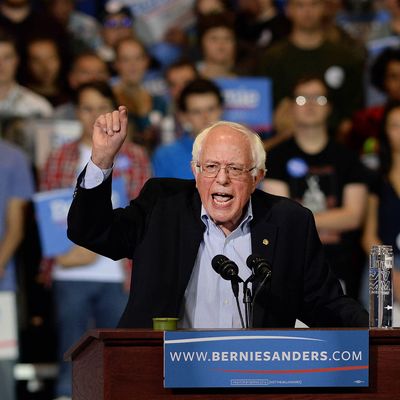
Last week, the Tax Policy Center published an analysis of Marco Rubio’s tax plan, which it found would increase the deficit by some $8 trillion over a decade, while conferring 40 percent of its benefits to the highest-earning 1 percent. As a share of the economy, Rubio’s tax cuts would be nearly twice as large as the 2001 and 2003 Bush tax cuts combined. A few days later, Rubio adviser Avik Roy fired off a blistering response. The Tax Policy Center was biased, he charged, because “there’s long been speculation” that the center had leaked an analysis of Mitt Romney’s tax plan to the Obama campaign in 2012. (Len Burman, the Center’s director, denied to me over email that anybody at the Center had done so.) Also, Roy charged, the Center had failed to account for the extra economic growth Rubio’s tax cuts would encourage. (It’s true the Center did not assume Rubio’s plan would make the economy grow faster, but the evidence is at least as strong that debt-financed tax cuts like Rubio’s inhibit rather than encourage economic growth.)
Roy is one of the smarter policy minds in the conservative movement. The problem is that he is working within the conservative movement, and within that movement, neutral technocratic analysis is viewed with inherent suspicion. The basic fault line within American economic policy has pitted technocratic liberalism against ideological conservatism. Liberalism is invested in ends — higher incomes for most people, better health, sustainable climate, and so on — which can be measured, and the means to attain it thereby adjusted. Conservatism is invested in the means — smaller government — which it equates with freedom, and which does not require empirical confirmation. In a recent National Review essay, Charles C.W. Cooke lists among the main accomplishments of modern conservatism “the tarring and feathering of the reflexively technocratic mindset that obtained from the outset of the New Deal to the end of the 1970s.”
Technocracy is inimical to conservatism because it allows for the possibility of remedies conservatives would rule out on philosophical grounds. Conservative movement economists were united in their rejection of fiscal projections which showed that Bill Clinton’s 1993 combination of tax hikes and spending cuts would reduce the deficit, or that George W. Bush’s 2001 tax cuts would explode it, and when those very things happened, nobody within the movement rethought their assumptions. Instead they dismiss technocrats as harboring suspicious counter-motives of their own, i.e. scientists claim greenhouse-gas emissions cause rising temperatures because they want to force governments to give scientists more power. Roy warns that the Tax Policy Center calculates that enormous tax cuts for the rich tend to reduce revenue and increase incomes for the rich because “cutting taxes makes it harder for the government to spend more money.”
There is no cost within the GOP for dismissing technocratic conclusions on ideological grounds. In the Democratic Party, there is. In 2005, I wrote a little essay about the asymmetry between liberalism and conservatism — the former being inherently technocratic, and the latter inherently anti-technocratic. In it I suggested the true parallel to conservatism is not liberalism but socialism. Like conservatism, but unlike liberalism, socialism has strong moral principles about markets, government, and ownership that override any measurable impacts of a specific policy. A decade ago, socialism was so remote from mainstream political debate that the comparison was theoretical. Now the Bernie Sanders campaign has made it a live issue.
The Democratic Party’s wonk class is being riled up over what might seem, at first blush, to be a small issue. Sanders’s campaign has relied on implausibly optimistic growth forecasts to support its health-care plan, and, as Annie Lowrey explains, justified those forecasts by assailing critics as “Establishment.” The dispute helps firm up the somewhat nebulous question of just what Sanders means when he described himself as a “socialist.” Sanders has described himself as “not believing in the capitalist system,”
What Sanders’s version of socialism seems to mean instead is a reflexive distrust in markets that is the ideological mirror image of conservative distrust of government. He may not be proposing to shut down Apple (any more than Ted Cruz wants to eliminate Medicare). But Sanders does not feel compelled to constrain his policies with ordinary cost-benefit calculations. If reality intrudes upon his ideological ambitions, then reality, rather than the ambitions, must give way.
I am personally sympathetic to technocratic government. But it is important to concede that technocracy is not inherently correct; it is a value judgment. It’s perfectly valid for tax-cutting conservatives to care more about slashing government than about how this will bear upon government revenue or access to health insurance; it’s likewise valid for Sanders to care more about eliminating the role of private insurance than how this will fit into his budgetary plans. Sanders’s evident disdain for technocracy is not a campaign failure. Just the opposite: liberating the Democratic Party from the constraints of technocracy may be a primary goal of his political revolution.






























